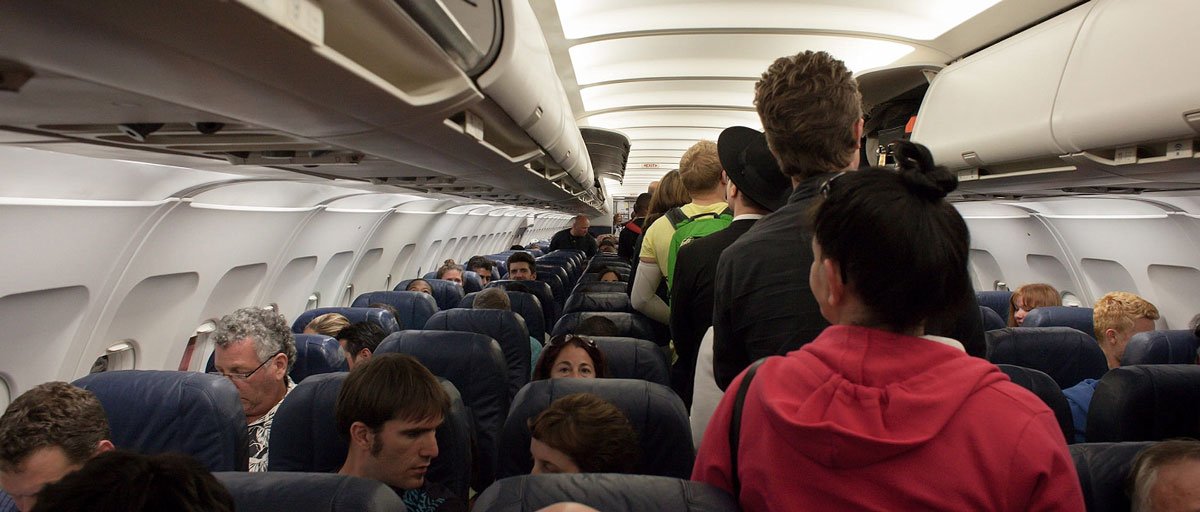Bildtext får vara max två rader text. Hela texten ska högerjusteras om den bara ska innehålla fotobyline! Photo: B. Christensen/Azote
SUSTAINABLE TRAVELLING
What it will take to fly less
- Study investigate what motivates people in Sweden to reduce or stop flying, and what prevents them from making those efforts
- The authors find that most incentives to reduce or stop flying come from personal values and beliefs
- However, flying is still the norm for travelling and even with deep conviction, it is a habit that remains difficult to change
Growing knowledge about climate change makes people want to reduce their flying. But more sustainable travelling still hampered by a striking lack of political incentives
STAYING GROUNDED: For people who fly, reducing air travel is one of the most efficient ways to decrease individual greenhouse gas emission. One transatlantic flight uses up a person’s entire annual sustainable carbon budget.
Though knowledge of this is widespread, and concerns about climate change and environment seem to be increasing, something keeps people from staying on the ground. An intricate interplay between values, beliefs and norms seems to stand in the way of acting upon one’s knowledge.
In a study published in Sustainability, former centre master’s student Lisa Jacobson, together with colleagues investigate what motivates people in Sweden to reduce or even stop flying, but also what prevents them from making those efforts.
The authors depart from the “three spheres of transformation framework” to find where incentives to fly less might occur: the personal sphere that includes values and beliefs, the political sphere including legal or financial restrictions, or the practical sphere including for example availability of fewer flights.
Internalizing knowledge is key
The authors find that most incentives to reduce or stop flying lay in the personal sphere. Those who had made this decision had, according to the authors “internalized their knowledge of climate change, connecting it to emotions and their private life”. Growing knowledge about climate change and the impact of flying, and negative emotions such as anxiety and guilt, led many to do something concrete to reduce their carbon footprint.
Jacobson says, “The importance of internalizing knowledge to spur action highlights the need for improved communication and education about climate change, and the need to create different incentives for different groups."
Those who had taken action had been motivated by doom and gloom messages on environmental disaster – the same messages that those who took no action were blocking out. For them, Jacobson explains, changed social norms, more expensive flights and better alternatives are probably more effective.
Shifting the norm
However, flying is still the norm for travelling and even with deep conviction, it is a habit that remains difficult to change, particularly without viable alternatives to travel. The study shows a striking lack of political incentives to choose more sustainable travel alternatives.
“Many interviewees who reduced or quit flying felt counteracted and even ridiculed by society, says Jacobson.
Jacobson and her colleagues, including former SRC researchers Avit Bhowmik and Matteo Giusti, conclude that in order to reduce the climate impact of flying interventions must include change of norms, effective policy instruments and better alternatives to air travel.
On the upside, those who had quit or reduced their flying had found a new appreciation for slow travel. Their positive experiences could be an important part in shifting perceptions of what is desirable.
Methdology
The authors conducted qualitative, semistructured interviews with the aim of understanding air travel reduction based on the interviewees’ own perceptions. Participants were sampled mainly through advertisements in Facebook groups. In total 26 people were included in the study, 10 who had quit flying, 9 who had reduced, and 7 who had made no change in their travel behaviour.
Background knowledge was gathered from peer-reviewed articles and from reports from Swedish authorities and through following the air travel debate in general and social media.
Jacobson, L., Åkerman, J., Giusti, M., Bhowmik, A.K. 2020. Tipping to Staying on the Ground: Internalized Knowledge of Climate Change Crucial for Transformed Air Travel Behavior. Sustainability, 12(5), 1994









